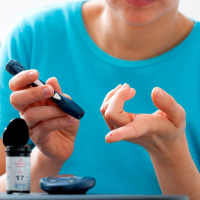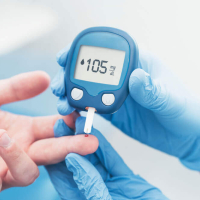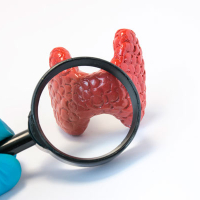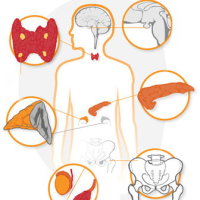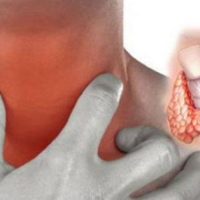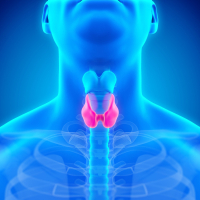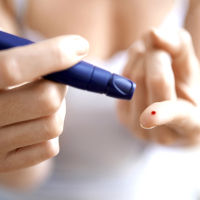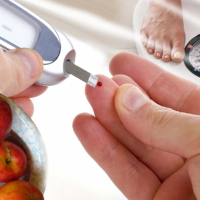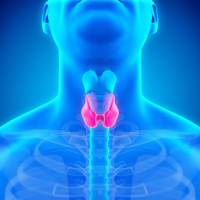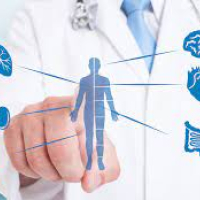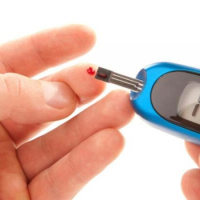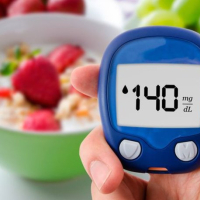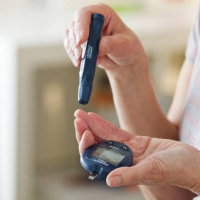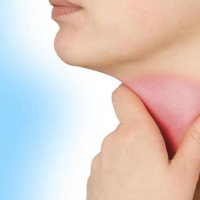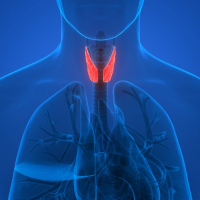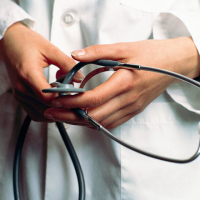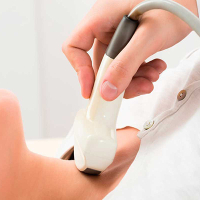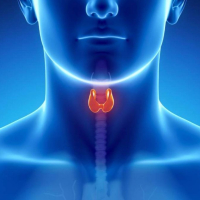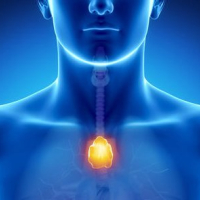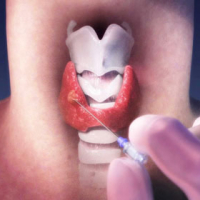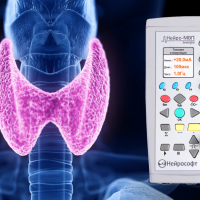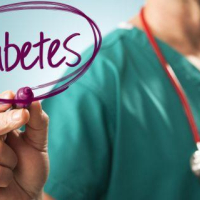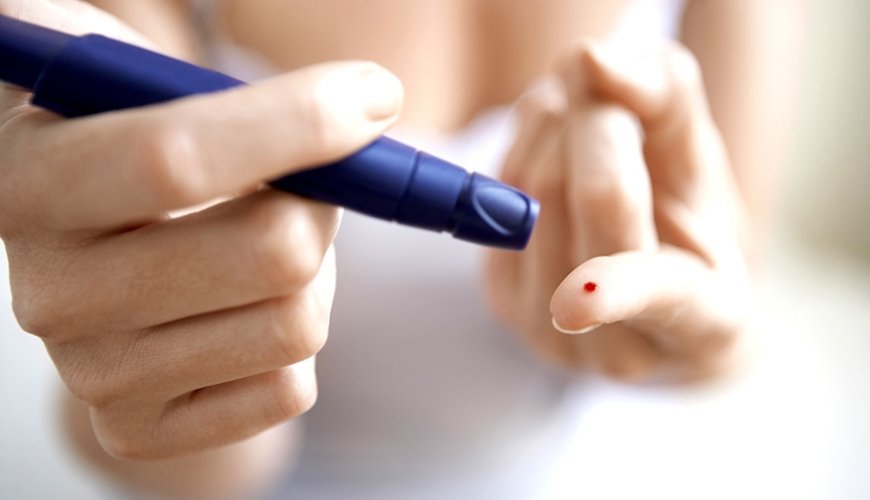Diabetes
Diabetes is a lifelong disease that develops when a secretory gland called the pancreas does not produce enough of the insulin hormone in your body, or when the insulin hormone it does produce cannot be used effectively. As a result, a person cannot use the sugar that enters the blood from the food he eats, and blood sugar rises (hyperglycemia).
- Most of the foods we eat, especially foods that contain carbohydrates, are converted into glucose to be used for energy in the body.
- The pancreas, an organ located on the back surface of the stomach, produces a hormone called "insulin" that enables our muscles and other tissues to take glucose from the blood and use it as energy.
- Glucose that enters the blood with food enters the cells through the hormone insulin. Cells use glucose as fuel.
- If the amount of glucose exceeds the body's fuel needs, it is stored in the liver (sugar store = glycogen) and adipose tissue.
- diabetes
- A person without diabetes whose fasting blood sugar level does not rise above 120 mg/dl or 140 mg/dl when full (two hours after a meal).
- If the blood glucose level measured during fasting or fullness is above these values, it indicates the presence of diabetes.
- Whether a person has diabetes is determined by a Fasting Blood Glucose (FGL) or an Oral Glucose Tolerance Test (OGTT). An FBC measurement of 100-125 mg/dl is a signal of latent sugar (diabetes).
- An FBC measurement result of 126 mg/dl or more indicates the presence of diabetes.
- In the OGTT, the blood glucose value 2 hours after ingestion of a glucose-rich liquid is important.
- In the second hour, if the blood glucose measurement is 140-199 mg/dl, latent sugar is diagnosed, if it is 200 mg/dl and higher, diabetes is diagnosed.
diabetes
Diabetes mellitus, which is one of the leading diseases of our time, is a type of disease that plays the first role in the formation of many fatal diseases and is very common throughout the world. The full name of the disease, Diabetes Mellitus, means sugary urine in Greek. In healthy people, fasting blood glucose levels are in the range of 70-100 mg/dL. If blood sugar levels rise above this range, it usually indicates diabetes. The cause of the disease is insufficient or lack of production of insulin hormone for any reason, or body tissues are not sensitive to insulin.
Type 2 diabetes is the most common type of diabetes, which has many different types and usually occurs in people over the age of 35-40.
In type 2 diabetes, also known as insulin resistance, although insulin production in the pancreas is sufficient, sensitivity to this hormone develops due to the inactivity of the receptors that sense the insulin hormone in the cells.
At this time, blood sugar cannot be transported to the tissues by insulin, and the level of glucose in the blood rises above the norm.
This condition is manifested by symptoms such as dry mouth, weight loss, drinking a lot of water, eating a lot.
Full adherence to the principles of treatment in type 2 diabetes, which is the primary cause of many different important diseases, is of great importance.
Long-term high blood sugar; Because it causes permanent damage to the entire body, especially the cardiovascular system, kidneys, and eyes, people diagnosed with diabetes should immediately receive diabetes education and follow a dietitian-approved nutrition program.
Symptoms of diabetes
Diabetes manifests itself in individuals with three main symptoms. These can be listed as eating more than normal and feeling full, frequent urination, dryness and sweetness in the mouth and therefore the desire to drink excessive amounts of water. In addition, other diabetes symptoms that can be seen in humans can be listed as follows:
- Feeling of weakness and fatigue
- Rapid and involuntary weight loss
- blurred vision
- Discomfort in the form of numbness and tingling in the legs
- Wounds heal more slowly than usual
- Dryness and itching of the skin
- An acetone-like odor is formed in the mouth
Causes of diabetes
Many studies on the causes of diabetes have concluded that genetic and environmental factors play a role in diabetes. There are mainly two types of diabetes, type 1 diabetes and type 2 diabetes, and the factors that cause the disease differ according to these types. While genetic factors play a role in the causes of type 1 diabetes, viruses that damage the pancreas, which produces the hormone insulin, which is involved in blood sugar regulation, and malfunctions in the body's defense system are also among the factors. causing disease. In addition, the causes of Type 2 diabetes, which is the more common type of diabetes, can be listed as follows:
- Obesity (overweight)
- Having diabetes in the family
- age forward
- sedentary lifestyle
- stress
- The development of gestational diabetes during pregnancy and the birth of a baby with a normal birth weight
Types of diabetes
- Types of diabetes are classified as follows:
- Type 1 Diabetes Mellitus (Insulin-Dependent Diabetes Mellitus): It is a type of diabetes that usually occurs in childhood due to insufficient or absent insulin production in the pancreas and requires exogenous insulin administration.
- Type 2 Diabetes: A type of diabetes caused by the insensitivity of cells to insulin, the hormone that regulates blood sugar.
- Latent Autoimmune Diabetes in Adults (LADA): Insulin-dependent diabetes similar to type 1 diabetes caused by autoimmune disease (the body's self-destruction as a result of a dysfunctional immune system) seen in later life.
- Maturity-onset diabetes (MODY): Type 2 diabetes-like diabetes mellitus seen at an early age
- Gestational Diabetes: A type of diabetes that develops during pregnancy
In addition to the types of diabetes mentioned above, pre-diabetes, also known as latent diabetes in humans, is when blood sugar tends to be slightly elevated before Type 2 diabetes develops, without being high enough to be diagnosed as diabetes. diabetes can be prevented or slowed down with proper treatment and diet. The two most common types of diabetes are type 1 diabetes and type 2 diabetes.
Diabetes diagnosis
The two most important tests used in the diagnosis of diabetes are the measurement of fasting blood glucose and the Oral Glucose Tolerance Test (OGTT), also known as the sugar loading test. Fasting blood sugar levels in healthy people average between 70 and 100 mg/dL. A fasting blood glucose level above 126 mg/dL is enough to diagnose diabetes. If this value is between 100-126 mg/Dl, postprandial blood sugar is investigated by administering the OGTT to the individual. As a result of measuring blood sugar 2 hours after a meal, a blood glucose level of more than 200 mg/Dl is an indicator of diabetes, and if it is in the range of 140-199 mg/Dl, it is an indicator of pre-diabetes. , called hidden sugar. In addition, the HbA1C test, which reflects the level of blood sugar in the last 3 months, above 7% indicates the diagnosis of diabetes.
How should diabetics eat?
Diabetics usually follow a special diet. A diabetes diet or diabetes diet means eating the healthiest foods in moderation and following regular meal times. In the diet of diabetic patients, preference should be given to a healthy diet that is naturally rich in nutrients and low in fat and calories. The main ingredients are fruits and vegetables and whole grains. In fact, the diabetes diet can be one of the best nutrition plans for many. If you have diabetes or prediabetes, your doctor will likely recommend seeing a dietitian to help you develop a healthy eating plan. This diet will lower your blood sugar. It can help you control (glucose), manage your weight, and control heart disease risk factors such as high blood pressure and high blood fats. Regular control is important in diabetes. Since sugar can cause many other diseases, regular health checkups are required. This will be vital for diabetes patients, because it is not only about diet, but also about how to check at regular check-ups.
Why is diet important for diabetics?
When you consume more calories and fat than your daily calorie needs, your body creates an unwanted spike in blood sugar. If blood sugar is not kept under control, it can lead to serious problems such as high blood sugar levels (hyperglycemia) and, if it persists, can cause long-term complications such as nerve, kidney and heart damage. By making healthy food choices and watching your eating habits, you can help keep your blood sugar levels in a safe range. For most people with type 2 diabetes, losing weight can make it easier to control blood sugar and provide a number of other health benefits. Therefore, the help of bariatric surgery is a gastric balloon that can be swallowed. If the doctor deems it necessary, it may be necessary to resort to methods such as a gastric tube.
Treatment methods of diabetes
- Treatment methods for diabetes differ according to the type of disease. In type 1 diabetes, medical nutrition therapy should be carefully applied in combination with insulin therapy.
- The patient's diet is planned by a dietician according to the insulin dose and plan recommended by the doctor.
- The life of people with type 1 diabetes can be made much easier with the application of carbohydrate counting, where the insulin dose can be adjusted according to the carbohydrate content of the food.
- In people with type 2 diabetes, in addition to diet, treatment usually involves the use of oral antidiabetic drugs to increase the sensitivity of cells to the hormone insulin or directly increase insulin hormone secretion.
Diabetes and high blood sugar levels in cases where recommended treatment principles are not followed lead to many health problems, primarily neuropathy (nerve damage), nephropathy (kidney damage) and retinopathy (retinal damage). Therefore, if you are a person suffering from diabetes, do not neglect to undergo regular examinations.



